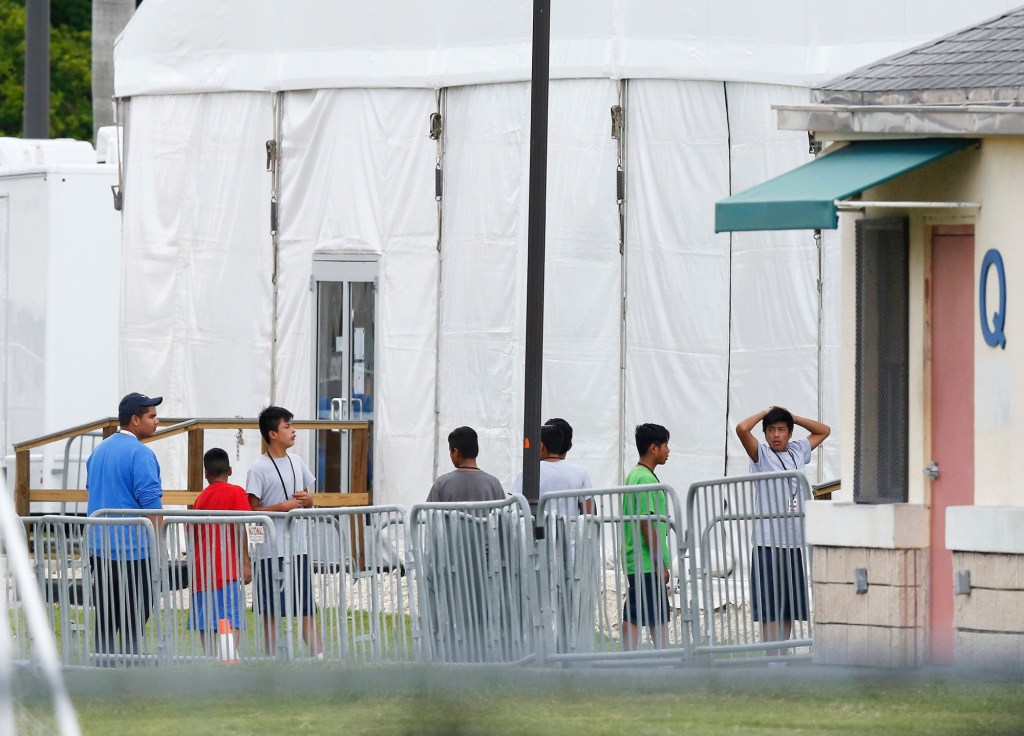The Trump administration violated a court order last month when it deported a migrant who’d been separated from his family at the border during President Donald Trump’s first term, according to a court filing this week by the American Civil Liberties Union.
The ACLU alleged that the deportation occurred just two days after San Diego-based U.S. District Judge Dana Sabraw ordered the government to temporarily halt all such removals of previously separated families who are covered by a historic class-action settlement, as new developments in the case are litigated.
That settlement — which was agreed to in 2023 by the Biden administration, and which Sabraw ruled last month that the Trump administration is violating — is aimed in part at providing legal support and social services to the previously separated families to ensure they have a fair shot at seeking asylum in the U.S.
Attorneys connected to the case believe the Trump administration is trying to undermine the settlement. As evidence, they point to the violation that Sabraw already ruled on, the administration’s cancellation of contracts with key service providers and now the deportation that was carried out despite Sabraw’s order.
“It feels like every string is being pulled to unravel it,” said Anilú Chadwick, pro bono director at Together & Free, a group that has worked with separated families since 2018.
In addition to the deportation, the ACLU alleges that a Guatemalan mother and her 13-year-old son, who had been previously separated and were members of the settlement class, were also recently removed from the U.S. along with two other family members. Those deportations occurred just hours before Sabraw ordered that the government “shall not remove any additional class members or (qualifying family members)” while the government and ACLU continue to litigate over the implementation of the settlement.
The government has not yet responded in court to the ACLU’s allegations about the recent deportations, and neither U.S. Immigration and Customs Enforcement nor its parent agency, the Department of Homeland Security, responded to requests for comment from the Union-Tribune.
According to the ACLU, attorneys for the government did provide some context in an email, writing that the deportation two days after the judge’s halt order occurred because “not all relevant ICE personnel had received the court’s order.”
In its court filing, the ACLU asked the judge to order the government to provide detailed explanations about how and why it deported people covered by the class-action lawsuit. Sabraw granted that request late Friday, ordering the Trump administration to provide details about the deportations no later than Monday.
The ACLU’s filing was part of a broader effort over the past several months to protect and enforce the settlement. That agreement was the culmination of a lawsuit filed in February 2018 in San Diego federal court against the first Trump administration that initially centered on the legality of separating migrant parents and children who arrived at the U.S.-Mexico border.
After Sabraw ruled that such separations under Trump’s “zero-tolerance” policy were unconstitutional, the focus of the litigation turned to reunification efforts. Later, when the Biden administration inherited the case, efforts turned to a settlement. One component of the eventual agreement prohibited the government from reenacting for at least eight years immigration policies that separate children and parents. The other component mandated that the government provide certain services to the families it had separated, including legal support for immigration and work authorization claims and certain medical coverage and behavioral health services.
But many, if not most, of the services guaranteed in the settlement have lapsed in recent months as the Trump administration has ended contracts with two nonprofit organizations that were central to providing or coordinating those services. The administration argues that it has the right to choose different service providers, though it concedes that process would take months to complete.
But attorneys said the separated families are already being harmed by not receiving the services they’re entitled to.
“The absence of legal services makes it easier to detain and remove” those families, said Sara Van Hofwegen, the managing director of legal access programs at Acacia Center for Justice. That organization was the main nonprofit coordinating legal services for the families until the administration cut off its contract.
Sabraw ordered the government last month to renew its contract with Acacia as part of its remedy for violating the settlement. The government has not yet reinstated the contract, arguing that it should be able to contract with a more cost-effective organization to coordinate legal services. The government has also cut off its contract with Seneca Family of Agencies, the main contractor that had been coordinating the health care and social services outlined in the settlement.
“These are very technical breaches of a legal settlement, but that’s not to say these aren’t enormously consequential breaches,” Lee Gelernt, the lead attorney for the plaintiffs and the deputy director of the ACLU’s Immigrants’ Rights Project, said Friday. “There is a direct cause and effect between these contracts being terminated and ultimately people being re-separated and deported. There’s no way they can obtain parole and seek asylum if they do not have legal services help.”
Chadwick and Van Hofwegen said they’ve both heard of other class members being detained by ICE, and they worry about what will happen to them without the legal support they’re entitled to by the settlement.
A hearing is set for next Thursday in which Sabraw could rule on additional issues in the ACLU’s effort to enforce the settlement.
